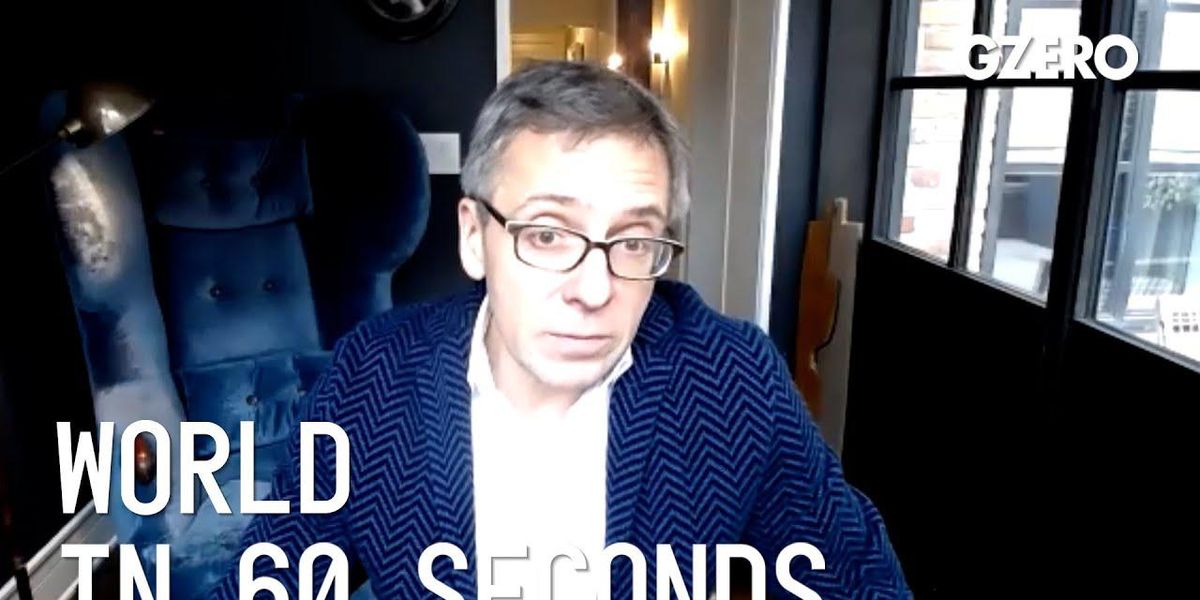Trending Now
We have updated our Privacy Policy and Terms of Use for Eurasia Group and its affiliates, including GZERO Media, to clarify the types of data we collect, how we collect it, how we use data and with whom we share data. By using our website you consent to our Terms and Conditions and Privacy Policy, including the transfer of your personal data to the United States from your country of residence, and our use of cookies described in our Cookie Policy.
{{ subpage.title }}
Why the UK is on lockdown; Iran pushes Biden on uranium levels
Ian Bremmer shares his perspective on global politics on this week's World In (More Than) 60 Seconds:
Why is the UK going on lockdown again?
I know. And it looks like six weeks to, this is the highest level of lockdown they do. And it's this new strain of coronavirus, which it's not more lethal, but it is much more infectious. And thank God all of the vaccines work equally well against it. But nonetheless, the vaccines are still very early stages in rolling out and coronavirus is a very robust stages of rolling out. So, you were getting greater levels of hospitalization right now in the UK than in their spring peak. The case levels were exploding and so they just shut it down. Germany is extending their lockdown and here in New York City, I just heard yesterday, we've got the first confirmed cases of the new strain. This is, it's not a game changer because the vaccines are the game changer and the vaccines are rolling out and as they do, we're going to feel very, very differently, but it does mean that explosive caseload and more hospitalizations, and indeed more people dying in the coming weeks is something we're going to have to gird ourselves for. But I still think, when you looked at our top risk piece this year, we didn't make coronavirus, the number one risk and it's because of the vaccines. Also, in the nature of this disease that really does focus so much of the mortality is in a very small percentage of the population, the most elderly and the most sick. And so, in just a few weeks, four, six weeks, when we get to 10% of the population in the US that's been vaccinated, suddenly you're going to have probably some 90% of the mortality taken out of the disease. You still have concerns about long COVID, you still have people that can be sick for a long time. But just think psychologically about how much we've all been carrying about just been worrying, the worry we've had of the people that we are close to who are in their high seventies or older, or already have medical conditions and we know that if they are to get this disease, they could very easily die. That is something we're not going to have to worry about in just a few more weeks. I think that's the game changer for 2021, frankly. That's a really good news story, so something that's worth mentioning.
Okay, what do I make of Iran increasing its uranium enrichment levels?
To 20% is almost nuclear bomb grade or enrichment level. And what it means is they are pushing Biden really hard, they want to get back to the old Iranian nuclear deal, no ifs, no buts, no preconditions. And Jake Sullivan, the incoming national security advisor has made clear that, well actually, they're willing to go back to the old JCPOA as it's called that's the nuclear deal, but not by itself. They also want to open negotiations at the same time on ballistic missiles and on Iran's support for radical organizations in the region. And the Iranians want no preconditions, I think that a compromise can be found, but not easily. And the decision of Iran to push the enrichment quickly is something they don't need to do; they did on the anniversary of Soleimani's assassination by the United States. I mean, it's a little bit of national pride in Iran, which has had a much tougher year than most around the world right now. But on balance, it's really a message incoming to Joe Biden.
And then finally, with Saudi Arabia lifting its embargo on Qatar, what does that mean for the region?
Well, it's a positive. I mean, what we're seeing is the geopolitics are normalizing. When you're a CEO and you think about the Middle East, you think primarily in terms of risk, the risk environment in the Middle East is reducing somewhat around geopolitics. Israel is normalizing relations, opened diplomatic engagement directly with a number of Arab States and others are moving in that direction, even the Saudis. The GCC Blockade, breaking apart that organization because the Saudis and the UAE were fundamentally breaking ties, economically, diplomatically with Qatar, that the fact that that's ending is useful for everybody. Frankly it's even useful for Iran relations because Qatar has been able to be a conduit and interlocutor, which they obviously couldn't serve that role when the Saudis and UAE had frozen them out. So, I think there's really no downside here and I'm glad to see it. And if it's something that Trump gets to run a bit of a victory lap on God bless, he was a little bit responsible for the flare up to begin with because he didn't do very much to his closest allies when they started heading in this direction. But it's good to get it done and it's one problem that Biden doesn't need to worry about, he's got plenty, when he becomes president in a couple of weeks.
